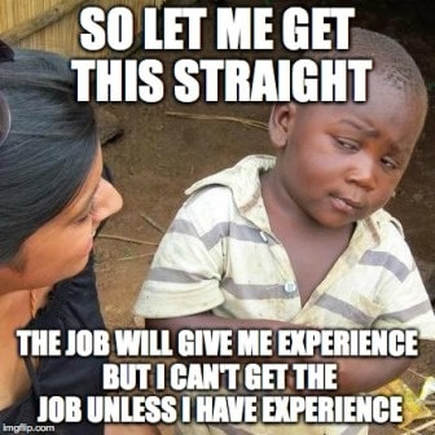 Facing risk and failure is essential to personal growth Facing risk and failure is essential to personal growth
1) Risk Assessment What is the opportunity you are considering? What are the potential risks related to pursing this opportunity? The point of this exercise isn't to convince you that there is no risk or nothing to fear. Rather than pretend we can simply will ourselves into a positive outcome, we want to ensure that we are following best practices by identifying risks prior to making decisions. 2) The Risk Formula A simple tool for calculating risk is to start with the end. The risk formula starts by calculating the worst case scenario for the opportunity than an organization or individual is considering. Can you picture it? If we go down this path, what could (and probably will) go wrong? If everything went wrong and we completely failed, what would that look like? Could we survive the worst possible outcome? 3) The Classic Pro's and Con's Sometimes those tools that are tried and true are considered such because they work. Referring back to our risk formula, if we cannot survive the worst possible outcome we will have to ask ourselves honestly if pursuing our opportunity is worth the reward. Does the potential reward (which isn't guaranteed) outweigh the potential losses? Are the risks low enough that we can offset our losses as we pursue our opportunities? Are we in a position that we can afford to move (or not to move)? Failure to launch can be just as traumatic to our long term growth as launching only to fail. As we have noted previously, some of our most creative solutions and our life long lessons are born from failures along the way that have caused us to adapt. 4) Failure to Plan is Planning to Fail We have considered the worst case scenarios, and we believe we can survive them. We have analyzed our opportunities and believe that we must make a move on them. The risk is identified, the fear of failure has been addressed and not it's time to prepare to move forward. Smart operations are not oblivious to risk nor do they sweep their fears (or reservations) under the rug, they make them visible and work for progress without allowing fear to deter them from the goal. 5) Action Much is made of risk, but fear of failure and/or fear of success may be the biggest underlying obstacles to personal as well as professional growth. The homework has been done, the map has been laid out to the best of everyone's abilities, and so it is time to get the wheels of opportunity moving. Action may lead to unexpected forks in the road but inaction will only lead to the eventually demise of having a fork stuck in your operation. Adaptation should be valued over deterioration. Risk Management Best Practices in Business Risk management should be a process in the decision leading to opportunity identification, growth mapping and the celebration of a job well done. Risk management is essential because growth is essential and there is no growth without some level of risk. Risk management does not stop the engine, it guides the vehicle safely through the obstacle course of growth and vision. IZ Ventures - business coaching & consulting. We don’t just consult - we help you Connect, Collaborate & Conquer.
0 Comments
 There is always risk of failure. Fear of failure should never be the deciding factor when engaging an opportunity for growth. Failure is a reality. Risk in inherent when you are attempting to do something worthwhile. Factors can increase or decrease risk. Far is one of those factors that serves as a speed bump to cause one to pause for some self evaluation. Even when we fail, we must remember that failure by itself is not final unless it is allowed to be. Failure should be embraced as part of the growth process. Failure causes smart organizations to learn and adapt. Atychiphobia. The strain of fear that immobilizes an individual or an organization due to fear of failing is noted in psychological circles as, atychiphobia. Fear is natural. Failure is natural. Fear of failure is therefore logical. Yet, immobilization due to fear of failure or morbid fear of the unfortunate, is unhealthy and unproductive. Get your vision in motion and when you meet those forks of fear in the road of your mission take a moment to practice the following: 1) Call out the risks - identify your fears 2) Resource your options - connect with insights and skills 3) Develop creative solutions - collaborate with your team Allow fear to speak. Stare down the risk of failure. Set your vision in motion rather than pull the emergency break on your momentum. No guarantees. Positive results are not guaranteed. All adventures will lead an organization to learn from the process whether the results were achieved as intended or through adaptation. A vehicle in motion is easier to steer than a vehicle that stays on the lot. Whether for fear of failure or as a protective measure, inaction is often the greatest risk as it will certainly lead to a negative result through deterioration. The failure mantra. Where there is opportunity there is risk. Where there is risk there is a failure factor. Navigate with vision and courage.  Hiring people from outside your industry bubble Hiring people from outside your industry bubble If you have found something to be true from your professional experiences and then find a respected publication that echoes those concepts, is this still confirmation bias? The reason many industries fail to innovate or self-disrupt before it's too late is that they only look for industry insiders to add to their organizations. We want the books of business and the low hanging fruit of a professional who is ready to hit the streets from day one. Many leaders know from painful experience, hiring carry overs from a competitor carry their own challenges and/or baggage. Hiring from a short list within an industry bubble does not create a lot of room for introduction of new ideas, perspectives and strengths. While I strongly believe that an organization should promote from within they also should be looking to extend their pursuit of quality individuals beyond the industry bubble. A company that spends all those resources to build a culture and a team that rallies around core values are too valuable to thin or disband through the lack of local progressive opportunities for people who have earned such through building the team. This commitment to internal growth does not mean that an organization should only build itself from those who are already versed in the field of operation. I am glad to hear a respected publication promoting this idea of recruiting candidates who either have no direct experience or who may be a bit of a gamble as they are not industry versed prior to joining your team. Author and CEO/Founder, Liz Ryan shares this challenge and insight, "When you hire someone who lacks industry experience, it challenges you as a manager. You get to see your new hire encountering your world, and that is an instructive thing to experience. You have to train your newcomer differently. You have to ask and answer questions you may not have considered for years — or ever." Too often we come to a point in our career where we are confident, if not comfortable, with what we know and we begin to first assume that everyone should know what we know (we got our elbows deep in the mud earning our experiences) and secondly that we forget to re-invest those nuggets of wisdom into our teams. We forget that it took many years for us to get where we are and we want immediate results from those who are working on our teams, we lose a bit of our patience when we lose our connection to the ground floor. We want a mix of backgrounds, perspectives, ideas and strengths on our teams so that we will continue to challenge each other to be the best that we can be every day. Business is sport, its a competition against our opponents as much as it is against ourselves to not settle in the victories already won. Unfortunately, in the current climate you are either growing or you are dying, there are no other options. So what do we do? Do we just hire the next ugly duckling that comes along and turn them into the star quarterback? That's not the concept as this should not be about bolstering our already inflated egos but rather a means to challenge and build our organization by infusing it with new perspectives, strengths and potential. In our experience we believe the criterion has been fairly simple, is the candidate 1) honest, 2) hard working and 3) willing to learn? If they can bring these three character traits, items that we cannot give them, then we can train them to have the opportunity to be successful in our industry. Anymore we are looking for relevant as opposed to direct experience. Someone may not have the technical skills in our industry but if they have the work ethic, relational strengths, a track record of team building, or other strong qualities that will help our team, we want to bring them in. "You will shake up your own thinking," states Liz Ryan, "When you hire outside your industry -- and that may be the best gift of all!" Resources: Liz Ryan - https://www.forbes.com/sites/lizryan/2017/09/24/five-reasons-to-hire-someone-with-no-industry-experience/#720b80656de3 More from izvents - Attracting Talent, What To Look For and Hiring, Three Character Keys. by Jon Isaacson Risk of failure is a constant - if there is no risk of failure than there is no challenge and likely no reward worth pursuing. The biggest risk is not taking any risk... In a world that changing really quickly, the only strategy that is guaranteed to fail is not taking risks. Mark Zuckerberg  Overcoming the fear of failure in the pursuit of growth Overcoming the fear of failure in the pursuit of growth As a follow up to our more extensive treatment of the fear of failure and the practice of personal risk management in the pursuit of growth covered HERE, we share the highlights of how to overcome fear. The psychological term for immobilization due to morbid fear of failure or the unfortunate is called atychiphobia. Are you atyciphobic? If you are pursuing something that is worthwhile and has the potential for a reward on effort (ROE), then you understand there is no avoidance of risk of failure. You may fear failure, you would be stupid not to, but that fear should not be allowed to be the presiding factor in whether to do or not do something. Failure is a reality. As a risk factor fear is a speed bump that causes evaluation, but failure by itself is not final unless it is allowed to be. Failure is a part of the growth process that causes smart organizations and individuals to learn while they weave through obstacles in the pursuit of vision expansion. A fork in the road should be a call to identify risk, resource options and develop creative solutions rather than pull the emergency break to freeze all momentum. You are a smart person, so don't be stupid - you know that positive results are not guaranteed. Every risky venture is a growth adventure and the process will lead us as an organization or individual to learn from the process. The likelihood that we arrive at the destination in precisely the manner as planned is unlikely. A smart process that takes on risk in the pursuit of growth must include adaptation. Our process, like a vehicle in motion, is easier to steer and adjust as we go. Don't be like the atyciphobics who are still parked in the "safety" of the garage, too afraid to take on the risk that will lead to adventure. Whether for fear of failure or as a protective measure, inaction is often the greatest risk as it will certainly lead to a negative result. Jon Isaacson is a freelance writer assisting organizations to translate their mission and vision into story. I am a business practitioner who specializes in employee engagement, systems optimization and business development with creative solutions that are grounded in practical applications. In addition to working full time, raising a family and volunteering, Jon writes, speaks and serves as director of local facilities networking group LFMC.
|
AuthorThoughts on personal and professional development. Jon Isaacson, The Intentional Restorer, is a contractor, author, and host of The DYOJO Podcast. The goal of The DYOJO is to help growth-minded restoration professionals shorten their DANG learning curve for personal and professional development. You can watch The DYOJO Podcast on YouTube on Thursdays or listen on your favorite podcast platform.
Archives
March 2023
Categories
All
<script type="text/javascript" src="//downloads.mailchimp.com/js/signup-forms/popup/unique-methods/embed.js" data-dojo-config="usePlainJson: true, isDebug: false"></script><script type="text/javascript">window.dojoRequire(["mojo/signup-forms/Loader"], function(L) { L.start({"baseUrl":"mc.us5.list-manage.com","uuid":"b9016446bd3c6a9f0bd835d4e","lid":"83282ffb9e","uniqueMethods":true}) })</script>
|
Jon Isaacson |
Connect. Collaborate. Conquer.
© COPYRIGHT 2015. ALL RIGHTS RESERVED.
|



 RSS Feed
RSS Feed